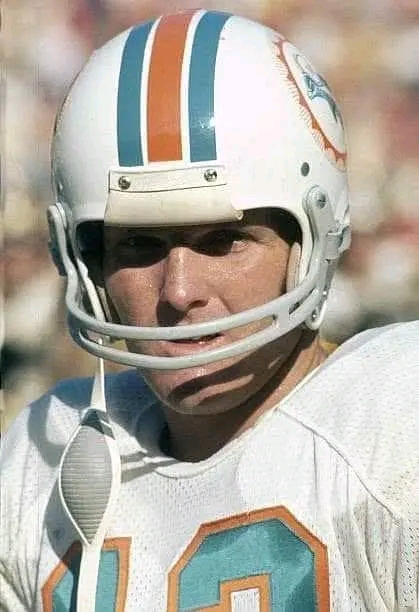Bob Griese: From Purdue Star to Dolphins Legend
Bob Griese’s journey from a standout college athlete at Purdue University to a legendary quarterback with the Miami Dolphins is a testament to his exceptional talent, determination, and leadership. A three-sport athlete in college, Griese’s legacy in football is built on a career marked by high achievement and remarkable consistency. His impact on both the college and professional game cemented his place in the annals of football history, culminating in induction into both the College Football Hall of Fame and the Pro Football Hall of Fame.
Early Years and Purdue University
Born on February 3, 1945, in Evansville, Indiana, Bob Griese grew up with an interest in sports. He attended Purdue University in West Lafayette, Indiana, where he excelled not only in football but also in basketball and baseball. As a quarterback for the Boilermakers, Griese quickly made a name for himself. He was known for his intelligence, quick decision-making, and ability to perform under pressure.
One of Griese’s most notable college achievements occurred in 1965 when he led Purdue to a historic 42-26 victory over the Notre Dame Fighting Irish. This upset victory not only shocked the college football world but also catapulted Griese into the national spotlight. By the time he graduated, Griese had earned All-American honors, and his ability to perform in clutch situations made him a coveted prospect for the NFL. Griese’s leadership and prowess in college helped set the stage for his future success, but it was his time with the Miami Dolphins that truly defined his career.
NFL Draft and Miami Dolphins
Bob Griese was selected by the Miami Dolphins in the first round of the 1967 NFL Draft, with the fourth overall pick. The Dolphins, led by head coach George Wilson, were in the early stages of their quest to become a dominant force in the league. Griese would soon become the centerpiece of the franchise’s success. His transition to the NFL was seamless. He possessed the ideal combination of skill, poise, and intellect to thrive in professional football.
Though Griese’s rookie year (1967) wasn’t extraordinary, he showed flashes of brilliance that hinted at the greatness to come. Over the next few seasons, he developed into one of the most reliable quarterbacks in the NFL, guiding the Dolphins to success with his ability to manage games, avoid mistakes, and make timely throws. Griese’s development coincided with the rise of Miami’s defense and running game, spearheaded by Hall of Fame coach Don Shula, who took over the team in 1970.
The Glory Years: Super Bowl Success
The early 1970s were the peak of Griese’s career and the defining period for the Miami Dolphins. Under the leadership of Griese, the Dolphins became one of the most formidable teams in the league, making a Super Bowl appearance in 1971, followed by a dominant victory in Super Bowl VII in 1972.
Griese was the driving force behind the Dolphins’ success during their back-to-back Super Bowl wins. His most impressive performance came in the 1971 season, when he led the Dolphins to a Super Bowl victory over the Washington Redskins. Although he missed part of the 1972 season due to injury, his leadership and steady play when he was on the field were pivotal to the team’s undefeated season. The Dolphins made history by becoming the first team in NFL history to finish the season with a perfect 17-0 record, a feat that still stands to this day.
Griese’s role in the Dolphins’ Super Bowl wins cannot be overstated. In Super Bowl VII, Griese’s ability to manage the game and make crucial plays when needed helped secure Miami’s 14-7 victory over the Washington Redskins. Even though he didn’t post jaw-dropping statistics in the Super Bowl, his efficient and effective play was instrumental to the team’s success.
Individual Honors and Legacy
In addition to his team achievements, Griese’s individual accomplishments were equally impressive. Over the course of his 14-year career with the Dolphins, Griese was selected to the Pro Bowl six times. His ability to perform at a consistently high level earned him recognition as one of the league’s top quarterbacks. Griese’s play also earned him the NFL MVP award in 1971, further solidifying his reputation as one of the best in the game.
Griese’s career was marked by his steady, calculated approach to quarterbacking. He was never known for a cannon arm or flashy plays, but rather for his ability to read defenses, manage the clock, and make key decisions in clutch situations. His unflappable nature and attention to detail made him a perfect fit for the Dolphins’ system, which prioritized a strong defense, a potent running game, and efficient passing.
In 1980, after 14 seasons with the Dolphins, Griese retired from professional football. His career achievements, including leading Miami to two Super Bowl titles, earning six Pro Bowl selections, and being named to the NFL’s All-Decade Team for the 1970s, were more than enough to guarantee his place among the NFL’s all-time greats. Griese was inducted into the Pro Football Hall of Fame in 1990 and the College Football Hall of Fame in 1983, cementing his legacy as one of the most accomplished quarterbacks in football history.
Conclusion
Bob Griese’s career is a testament to the power of hard work, consistency, and leadership. From his time at Purdue University, where he became an All-American, to his legendary career with the Miami Dolphins, Griese’s contributions to the game of football are enduring. His role in the Dolphins’ Super Bowl victories, his six Pro Bowl selections, and his induction into both the College and Pro Football Halls of Fame ensure that his name will forever be associated with greatness. Griese’s legacy stands as a reminder of what it takes to be a cha
mpion, both on and off the field.
